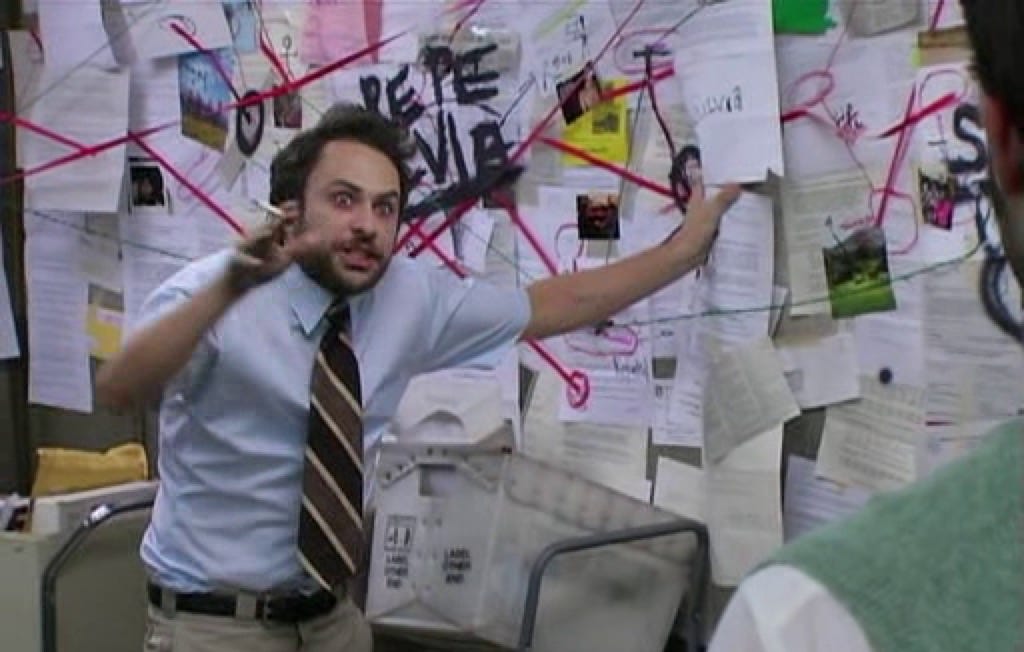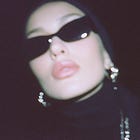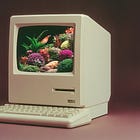How many books is too many books?
First of all, if you answered with any number, you can turn right around and get out of here because no one needs that kind of negativity when it comes to building a personal library.
:)
I'm sitting in the middle of my living room, surrounded by seven hundred + books, and I'm trying to remember when exactly this happened. When did I become the person who calculates thrift store discount days like a day trader watching the markets?
The answer lies somewhere between a pandemic-induced physics obsession and the moment I realized you could buy entire universes of thought for the price of a coffee.
I’ve always liked reading, but as a child I was the weird one gravitating toward dictionaries and encyclopedias, armed with post-it notes and an insufferable desire to pepper my vocabulary with newly discovered jargon—trying words out on my friends or parents or whoever I came into contact with, really. I liked random things. Categories and etymology and trivia. Still do.
But 2021 changed everything. After shutting my marketing agency down late in 2020 due to the pandemic, I took what I generously called a "sabbatical" and dove headfirst into books. Two to three books a day on some days. Nearly 250 books in eighteen months. I was reading like someone had told me the world was ending and all human knowledge would disappear unless I personally absorbed it.
Most of those books fell into what I now recognize as a beautifully chaotic intersection: business and spirituality. It sounds like the kind of combination that would make a philosophy professor weep, but hear me out. I was on sabbatical, which meant I felt obligated to read about entrepreneurship and building things, as if knowledge of profit margins might somehow justify my hiatus from productivity culture. But I had also just done shrooms with one of my best friends and had a totally perspective-shifting experience. So, naturally, I started asking the Big Questions.
“How did the universe get here?” “How did civilization begin?” “Where the f*ck did we even come from??” types of things. From there, physics felt like the only honest place to start.
And so my addiction began.
Seven hundred books and counting. That's where I am now. Seven hundred individual portals to other minds, other centuries, other ways of seeing. I started conservatively, buying only what I was actively reading—Target runs, Amazon orders, the occasional Thriftbooks.com purchase. But then I discovered the holy grail of book acquisition: thrift stores.
The thrift stores in Vegas do 50% off once a week, and they have this "buy 4 get the 5th free" policy that speaks directly to whatever part of my brain handles rationalization. Girl math dictates that I'm practically losing money if I don't buy twenty books at a time. It's economics, really. Fiduciary responsibility to my future self.
Physics, as it turns out, is the gateway drug to everything else. And I mean everything. Once you start understanding that physics literally rules the universe, you begin to see its fingerprints on every human endeavor. It's connected to art history through the way light behaves, to literature through the metaphors we use to describe time, to philosophy through our attempts to understand consciousness itself.
First came art history. I started reading about the intersection of physics and painting—how scientific discoveries were literally changing the way artists saw and depicted the world. The Renaissance suddenly made sense not just as an artistic movement, but as a scientific revolution made visible—it was a systems-level shift in how people thought. It was when humanity started waking up to its own potential again after centuries of spiritual and intellectual suppression.
This led me to the thinkers behind it: da Vinci, Galileo, Machiavelli, Brunelleschi. The polymath builders. People who weren’t afraid to combine art, science, architecture, religion, and invention in one mind. I became obsessed with how culture changes when multiple disciplines collide. It wasn’t just about brushstrokes or churches—it was about cosmology, knowledge transmission, and power.
Which naturally led me to religion and the Dark Ages—the contrast point to the Renaissance—because you can't understand the explosion of human creativity without understanding what came before. I wanted to understand what had been lost and what was being rediscovered. How ideas get buried, who gets to preserve them, and how fragile our intellectual inheritance really is. That’s when I started making a massive mind map in Notion, connecting themes across time: eras, concepts, technologies, belief systems, economic shifts. I wanted to see history as a living network, not just a timeline.
Systems thinking, it turns out, is both a blessing and a curse. Every book connects to every other book. Every idea has ancestors and descendants. There's no such thing as isolated knowledge.
Eventually, inevitably, I found myself drawn to literature. I’d always assumed literature was too soft or symbolic to really sink my teeth into—but once I had context, it started to hit differently. Suddenly a novel wasn’t just a story. It was a cultural artifact. A timestamp. A philosophical argument disguised as entertainment. I fell in love. I now keep all my literature and art books in my bedroom like the prized possessions they are. There's something about having Dostoyevsky on my nightstand that feels like having a conversation partner who's been waiting patiently for decades for me to be ready to understand what they're trying to tell me.
I actually wrote a piece about this—sleeping with the dead—on why I wanted to sleep beside ancient ideas just to feel close to the minds that came before.
But here’s the part I’m slightly embarrassed to admit: I never took a real art history class. I never learned how to read literature with any depth. I went to an all-girls private Catholic school for two years (not by choice) before convincing my mom to let me transfer to the public school down the street. By junior year, everything was repeat material from the private school, so I basically just coasted. I was good at sports, decent at showing up, but terrible at actually engaging with the kind of deep learning that would have served me well later. Looking back, knowing what I know now about life and learning, I wish I'd stayed at the private school. But hindsight is 20/20, or so they say.
So for the last five years, I've been teaching myself everything I wish I'd learned then. I'm using the internet, AI tools, podcasts, documentaries—whatever it takes to build the context I should have had decades ago. And slowly, finally, I'm starting to understand not just what these books are saying, but why they matter, and how they speak to each other across centuries and cultures and disciplines.
And by the way—if you’re not using AI tools to learn, you’re missing out. Tools like Claude and ChatGPT are incredible teachers of complex topics. Ten years ago, I’d have had to dig through library archives or manually Google for hours just to understand a single footnote. Now I can hold a conversation with an AI about a 1970s essay on semiotics or the evolution of linear perspective. It doesn’t replace the books—it complements them. Especially when you’re thrifting older titles that might be brilliant but dated.
My process has become almost ritualistic. I find an interesting book at the thrift store, bring it home, and start digging through it. When I encounter concepts or ideas that intrigue me, I start talking to AI about them. This works especially well because many of the books you find thrifting are older, so the material might be dated or need additional context. I still read cover-to-cover, but I've become obsessed with this non-linear process of discovery—finding things I wasn't expecting to learn, following intellectual threads wherever they lead. I end up learning things I wasn’t even looking for.
There's something magical about older books, about books that have been loved by other people. I used to look for pristine condition because I thought my shelf needed to look perfect, but over time I've come to treasure the used ones. The highlighted passages, the way someone else's thoughts live in the margins—it's like having a conversation with strangers across time.
Now I get genuinely excited when I find books that were clearly gifts. There's something about finding a book with old cursive in the front cover—"Happiest Birthday, my dearest Matthew. May this year bring you all the wisdom and love. — Gran and Pop, 1967"—that makes me feel connected to something larger than myself. These books carry stories beyond their own content. They're artifacts of human care, evidence that someone once thought knowledge was worth giving as a gift.
And when you find these types of treasures, you just have to lift it to your nose and smell it.
“I have always imagined that Paradise will be a kind of library.”
— Jorge Luis Borges
So here I am, surrounded by seven hundred books, starting to understand that this isn't really about the books themselves. It's about the conversations they enable, the connections they make possible, the way they transform a curious mind into a kind of archaeological site where every new discovery reveals layers of previous understanding.
How many books is too many books?
The real question isn't about quantity—it's about whether you're reading them, learning from them, letting them change you. Are you collecting books, or are you collecting conversations with the greatest minds in human history?
Because when you put it that way, seven hundred doesn't seem like nearly enough.
Off to buy some books!
XO, STEPF










Thanks for sharing! I almost exclusively buy used these days because the books themselves tell stories in their physical wear and handwritten notes.
i went to a book fair in february and bought 17 books in one go. never have i lost so much money in a single day and not regretted it.
i didn't realize the amount of books i was buying when i bought them, i just collected everything i liked. my pocket maybe empty but my brain was loving it